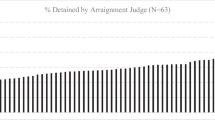Abstract
The idea that guilty pleas may be encouraged by time-conscious attorneys to process court caseloads expediently implies that some defendants may be influenced to forego their constitutional right to trial. If true, these defendants may be denied an adequate determination of legal guilt. Building on previous research, this paper presents a more thorough aggregate level test of the caseload pressure hypothesis than has previously been offered. Controlling for variation in structural and procedural characteristics across 101 Illinois circuit courts, this study supports the idea that felony caseload pressures significantly covary with felony guilty plea rates. Also, this relationship was stable between 1973 and 1984.
Similar content being viewed by others
References
Alschuler, A. W. (1983). Implementing the criminal defendant's right to trial: Alternatives to the plea bargaining system.Univ. Chicago Law Rev. 50: 931–1050.
Blau, P. M. (1971).Bureaucracy in Modern Society, John Wiley and Sons, New York.
Casper, J. D. (1972).Criminal Courts: The Defendant's Perspective, National Institute of Law Enforcement and Criminal Justice, Washington, D.C.
Eisenstein, J., and Jacob, H. (1977).Felony Justice: An Organizational Analysis of Criminal Courts, Little, Brown, Boston.
Enker, A. (1967).Perspectives on Plea Bargaining. Task Force Report: The Courts, President's Commission on Law Enforcement and Administration of Justice.
Feeley, M. M. (1975). The effects of heavy caseloads. Paper delivered at the 1975 annual meeting of the American Political Science Association.
Feeley, M. M. (1979).The Process is the Punishment, President's Commission on Law Enforcement and Administration of Justice.
Finkelstein, M. (1975). A statistical analysis of guilty plea practices in the federal courts.Harvard Law Rev. 89: 292–315.
Hagen, J., and Nagel Bernstein, I. (1979). The sentence bargaining of upperworld and underworld crime in ten federal district courts.Law Soc. Rev. 13: 467–485.
Halberstam, M. (1982). Towards neutral principles in the administration of criminal justice: A critique of supreme court decisions sanctioning the plea bargaining process.J. Crim. Law Criminol. 73: 1–49.
Hanusheck, E. A., and Jackson, J. E. (1977).Statistical Methods for Social Scientists, Academic Press, New York.
Heumann, M. (1975). A note on plea bargaining and case pressure.Law Soc. Rev. 9: 515–520.
Heumann, M. (1978).Plea Bargaining: The Experiences of Prosecutors, Judges and Defense Attorneys, University of Chicago Press, Chicago.
Heumann, M. (1979). Thinking about plea bargaining. In Nardulli, P. F. (ed.),The Study of Criminal Courts, Ballinger, Cambridge, Mass.
Jacob, H. (1973).Urban Justice, Prentice-Hall, Englewood Cliffs, N.J.
Jacoby, J. E. (1980).The American Prosecutor: A Search for Identity, Lexington Books, Lexington, Mass.
Kipnis, K. (1976). Criminal justice and the negotiated plea.Ethics 86: 93–105.
Landes, W. M. (1974). An economic analysis of the courts. In Becker, G. S. and Landes, W. M. (eds.),Essays in the Economics of Crime and Punishment, Columbia University Press, New York.
Langbein, L. L., and Lichtman, A. J. (1978).Ecological Inference, Sage, Beverly Hills, Calif.
Mather, L. M. (1979).Plea Bargaining or Trial? The Process of Criminal Case Disposition, Lexington Books, Mass.
McDonald, W. F. (1985).Plea Bargaining: Critical Issues and Common Practices, National Institute of Justice, Washington, D.C.
Meeker, J. W., and Pontell, H. N. (1985). Court caseloads, plea bargains, and criminal sanctions: The effects of section 17 P.C. in California.Criminology 23: 119–143.
Miller, H. S., McDonald, W. F., and Cramer, J. A. (1978).Plea Bargaining in the United States, Government Printing Office, Washington, D.C.
Nardulli, P. F. (1977).The Courtroom Elite: An Organization Perspective on Criminal Justice, Ballinger, Cambridge, Mass.
Nardulli, P. F. (1979a). Organizational analyses of criminal courts. In Nardulli, P. F. (ed.),The Study of Criminal Courts, Ballinger, Cambridge, Mass.
Nardulli, P. F. (1979b). The caseload controversy and the study of criminal courts.J. Crim. Law Criminol 70: 89–101.
Nardulii, P. F., Eisenstein, J., and Flamming, R. B. (1988).The Tenor of Justice: Criminal Courts and the Guilty Plea Process, University of Illinois Press, Urbana.
Nettler, G. (1978).Explaining Crime, McGraw-Hill, New York.
Pontell, H. N. (1984).A Capacity to Punish, Indiana University Press, Bloomington.
Spector, P. E. (1981).Research Designs, Sage, Beverly Hills, Calif.
Woodward, C. V. (1966).The Strange Career of Jim Crow, Oxford University Press, New York.
Zimring, F. E., and Frase, R. S. (1980).The Criminal Justice System: Materials on the Administration and Reform of the Criminal Law, Little, Brown, Boston.
Author information
Authors and Affiliations
Rights and permissions
About this article
Cite this article
Wooldredge, J.D. An aggregate-level examination of the caseload pressure hypothesis. J Quant Criminol 5, 259–283 (1989). https://doi.org/10.1007/BF01062740
Issue Date:
DOI: https://doi.org/10.1007/BF01062740




